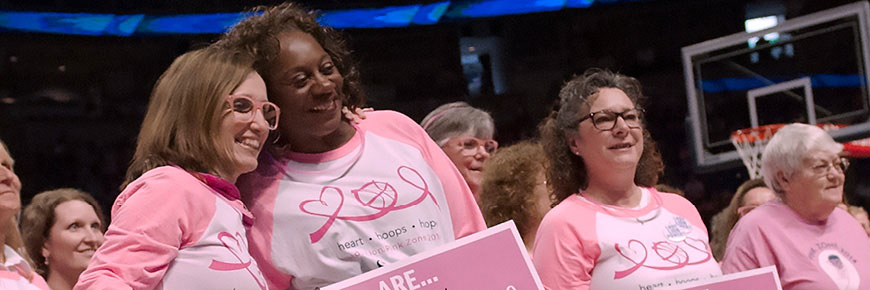Cancer Care and Prevention - Penn State Cancer Institute
Cancer Care and Prevention

Get started on your path to exceptional care.
What is Cancer?
Cancer is a general term describing over 100 different diseases. Cancer can form in any tissue of the body. Based on where the cancer begins, in what body organ/tissue, determines its unique characteristics and behavior. However, what all cancer has in common is the uncontrolled growth of abnormal cells, cells that no longer obey the body’s rules for self-regulation. Cancer cells also have the ability to spread to other parts of the body (metastasize).
How Can I Reduce My Risk?
You can lower your risk of getting cancer by making healthy choices.
Avoid Tobacco
Lung cancer is the leading cause of cancer death, and cigarette smoking causes almost all cases. People who live with smokers are more likely to develop lung cancer, and even limited exposure to secondhand smoke can raise your heart disease risk. Learn more how to avoid tobacco.
Eat Healthy
Making the right food choices is a powerful cancer prevention tool. Find out how to fight cancer with proper nutrition. Learn more about eating healthy.
Stay Active
Being physically active reduces your risk for many cancers and can help you maintain a healthy weight. Learn more about staying active.
Protect Your Skin
The best way to protect yourself from skin cancer is to limit your exposure to UV rays from the sun and tanning beds. Learn more about protecting your skin.
Limit Alcohol
Drinking alcohol raises the risk of some cancers, including mouth and throat cancers, liver cancer, colorectal cancer, and breast cancer. The American Cancer Society recommends limiting alcohol to no more than one drink per day for women and two for men. Learn more about how to limit alcohol.
HPV Vaccine
The human papillomavirus (HPV) vaccine is the best protection against HPV and related cancers. All boys and girls between the ages of 11 and 12 should complete the HPV vaccine series. Learn more about the HPV vaccine.
Not All Cancers are Alike
Although you may have the same type of cancer as someone else you know or read about, all the details related to your cancer may not be the same. Your physician will prescribe a treatment plan that is right for you based on the information gathered from various tests that have been performed. Please ask questions so we can help you understand this new information and partner with you in decisions.
Resources and Support
A cancer diagnosis is an emotional time. The information can be overwhelming. Treatments can be short term or extend over a longer period of time. Other people who have been through the experience may be able to give you suggestions on how to cope and communicate your feelings and needs to your family, friends and co-workers. Your physician, nurse and social worker are good resources for this information or can recommend a support group.
Online Resources
Internet websites can be used to find information about cancer, cancer treatment, clinical trials and other health-related resources. However, it is important to use caution when looking up health information on the internet. Make sure the information is from a trusted source and is up-to-date. Always discuss any information you find on the internet with your doctor and other members of your health care team.
